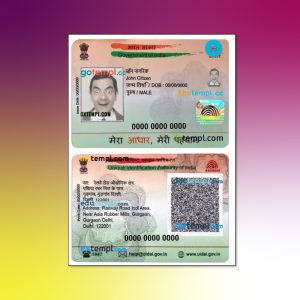In the fast-paced digital era, where technology reigns supreme, governments worldwide are constantly exploring innovative ways to streamline their systems. India, known for its technological advancements, has introduced a groundbreaking initiative called the Aadhaar PVC Card, revolutionizing the concept of identity verification. This unique identification system has transformed the way Indian citizens access government services and conduct everyday transactions. In this blog, we will delve into the significance of the Aadhaar PVC Card and how it has empowered individuals across the nation.
The Aadhaar PVC card
The Aadhaar PVC Card is a secure and portable document that contains a unique 12-digit identification number issued by the Unique Identification Authority of India (UIDAI). This card serves as proof of identity, residency, and demographic information for Indian citizens. The PVC card, made of durable material, ensures longevity and protection of crucial data.
Simplified access to Government services
One of the key benefits of the Aadhaar PVC Card is its ability to simplify access to a wide range of government services. From opening bank accounts and obtaining passports to availing subsidies and welfare benefits, the card has streamlined the entire process. By linking Aadhaar to various government databases, individuals can authenticate their identity with ease, eliminating the need for numerous physical documents.
Enhancing financial inclusion
Financial inclusion has been a priority for the Indian government, and the Aadhaar PVC Card plays a significant role in achieving this goal. With Aadhaar linked to bank accounts, individuals from rural and marginalized communities can access formal banking services easily. This has facilitated direct benefit transfers, reduced corruption, and empowered millions to participate in the formal economy.

Seamless mobile verification
In an increasingly digital world, mobile verification has become indispensable. The Aadhaar PVC Card provides a seamless way to verify one’s identity using mobile devices. By integrating the Aadhaar number with mobile SIM cards, citizens can complete the verification process conveniently and securely, ensuring the authenticity of their mobile connections.
Secure identity verification
Data security is a critical aspect of the Aadhaar PVC Card. The UIDAI employs robust encryption algorithms and multi-layered security measures to safeguard individual data. The card’s biometric authentication system, including fingerprints and iris scans, ensures accurate and secure identity verification. This advanced security infrastructure has instilled confidence in citizens, making the Aadhaar PVC Card widely accepted.
Addressing privacy concerns
While the Aadhaar PVC Card offers numerous advantages, it has also raised concerns about privacy and data protection. The Indian government has taken significant steps to address these concerns by implementing strict regulations and adopting robust data protection frameworks. The UIDAI has emphasized the importance of informed consent, ensuring that individuals have control over their personal information.
download an editable example: download
Conclusion
The Aadhaar PVC Card has revolutionized the way Indians verify their identity and access government services. By simplifying processes, enhancing financial inclusion, and providing secure verification methods, this initiative has empowered millions of citizens across the nation. As technology continues to evolve, the Aadhaar PVC Card stands as a shining example of India’s commitment to leveraging innovation for the greater good. With its secure and efficient framework, this unique identification system paves the way for a more inclusive and digitally empowered society.
